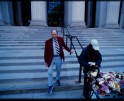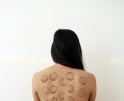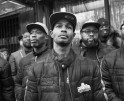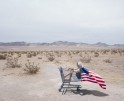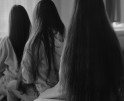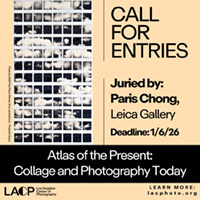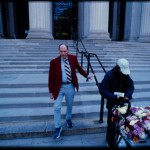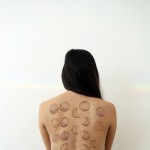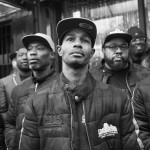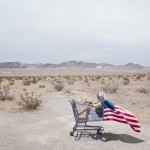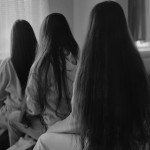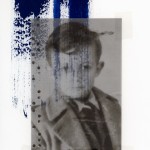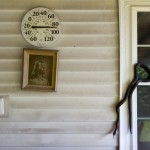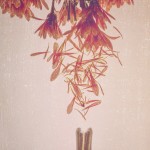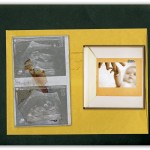Text + Image: Larry French: Stories Better Left Untold
Rosario
The ancient Mayans believed God was in the shape of a cloud and created everything in the universe. Christians believe that their God created the universe, and everything in it, including clouds. There is beauty in both. I am a cloud watcher and I look for them wherever I go. One of my favorite places to watch clouds is a small and modest cemetery on the outskirts of Santa Fe, New Mexico. It is called Rosario and there is something about the place that has always touched me. It is primarily Catholic and there are many statues of Christ reaching out to people or people reaching out to Christ. I find the dead of Rosario more welcoming than most. I walk among them with great care and respect and learn the history of their lives and families by reading their gravestones.
For me the best time to visit Rosario is in the fall when the cottonwoods of Santa Fe are turning gold and the smell of pinion smoke from the fireplaces drift out over the town. Rosario is a fine place to watch the clouds as they drift down from Taos. I visit in the early morning and walk among the dead as the sun rises, looking up at the sky for clouds. Often they are huge and billowing. People sometimes claim to see things in the shapes of the clouds, sailing ships, ancient cities or the face of God. For me it is enough that they are clouds. I may not see sailing ships, ancient cities or the face of God but I am always looking when I visit the Rosario cemetery; either down at the lives of the dead or up at the fast moving clouds. There is beauty in both. – Larry French
Often times, writing inspires imagery. Magazine articles, book covers, and novels have been illustrated and elevated by photographs or artwork inspired by the text. In the case of Larry French, it’s just the opposite, where the photographs inspire personal short stories, each uniquely told. His work is mysterious, ethereal, and dark, but his narrative text helps unravel the mysteries, giving insights not only into his art making, but into his psyche when the photograph was taken.
Born in Indiana, Larry French is a writer and photographic artist based in Los Angeles, California. He first studied photography during the early years of UCLAʼs fine art photography program, primarily under Robert Heinecken but also briefly with Robert Fichter. He continued his photographic studies at Art Center College of Design under Max Yavno.
His essays and short stories have been widely published appearing in many publications and anthologies including the Harper Collins Guide to College Reading and the Norton Anthology of Short Fiction. His photographs have been exhibited at group exhibitions throughout the United States and also, internationally, in Moscow, Budapest, Simferopol, Rome,Berlin, and Tokyo.
He currently represents the Gianmaria Buccellati Foundation in America
Yaahl
Once, long ago, I was the first to arrive at the scene of a terrible accident on an isolated country road in Indiana. I was very young. Two men were clearly dead. One no longer had a face and the other one was worse. There was also a woman who was apparently uninjured but was in a deep shock. I was afraid to leave her alone so I couldn’t go for help. I had never been near death before and felt helpless. All I could do was wait and hope another car would come by. I just stood there talking to a woman who wasn’t there and two men who never would be.
What I saw was the deep blue summer sky of Indiana and the bright green of the cornfields that surrounded us. What I heard was the ominous humming sound of millions of insects that seemed to come directly from the ground and from overhead, the caws of crows circling above the scene. I saw a few larger birds, which I took to be ravens sitting on the fence poles that lined the road. As time passed it seemed the crows were getting lower as they circled. I felt I couldn’t leave the woman alone so I was glad for the company of the crows and ravens. Finally, after half an hour, a car with two farm boys drove up then went to a nearby farmhouse to call for help. Soon the sound of the insects and the crows was joined by the sounds of an ambulance in the distance.
That night I told my wife the details of the accident but when we went to bed I was thinking not only of the dead but also of the crows and ravens that had been around the scene. I remembered once reading that certain Native American tribes believe that crows and ravens escort the soul into the afterlife. I always liked the thought of this, the rising effortlessly into the blue, and the soft touch of feathers as we are introduced to God. I felt bad for the crows and ravens though. Not for their journey to the afterlife, but for the long and lonely flight back with no one to talk to, just the sound of their wings in the night.
Albuquerque
I stood looking out a window in the early evening. I knew a storm was coming tonight, the clouds building out on the horizon, moving in. Once there was a woman, now just this run down motel on the edge of Albuquerque. I think I have seen too many broken neon nights, motel carpets stained with the history of strangers. That night in bed I heard the couple in the next room moaning, then footsteps outside my room, and heavy thunder in the gray distance. Someone is crying, a glass breaks in the alley behind the motel, and then I am asleep. I dreamed of the woman, the way her eyes would fade out and float away to another place when we were trying to work things out. A place I could never find. In my dream I see her eyes turn into clouds. A loud clap of thunder awakens me. I sit upright; the bed is wet from sweat. I turn on the lamp so I can stay awake and the dream will float away like her eyes. That night lightning strikes a red semi out on the interstate, the truck jackknifing into the wet ditch. I hear the sirens pass the motel. Things are slowly coming back to me.
It’s Albuquerque, 1 a.m.
Chinatown
Chinatown, Los Angeles. I am drawn to this place. I see things here I see nowhere else. I sense things here I may not want to know. I have come to believe coincidence does not exist here. There is a residue of the unexpected combined with leftover indifference and a light in the air that does funny things to the mind. Its early morning in Chinatown. I move down a side street and watch the fog roll off the brown hill at the same time the sun rises up from behind the metro tracks. The fog and sun come together and become lights that dance on the walls of the old warehouse on Alameda street. I walk up to Hill Street and see an acupuncturists doll in a broken window, the sun rising at my back. I smell hot oil and a dirty wind blowing from the east. I raise my camera. There are 361 points on the body that are used by an acupuncturist and there are two trillion galaxies in the observable universe. As an old friend is fond of saying, the whole thing is just a numbers game.
With God on the 395
When the wind is up out here you can hear the barbed wire humming in the hot night. Exhausted truckers listen while Hank Williams tells their stories. Out here it is always Sunday morning coming down and God, well God is everywhere if you find the right radio station. Once, out on the 395 south of Lone Pine, I stopped at a high desert truck stop and thought I heard the barbed wire singing. I walked up to it and gripped it with my hand and felt it vibrating. It wanted something from me that I had lost many years ago. There was white material hanging from the wire and I walked over and touched it. It felt like silk and I thought it was a wedding dress. I wondered what could make a woman throw away her wedding dress? Later in my life I would find out. I could smell diesel fuel in the air and felt guilty touching the dress. I walked back to my car and took off, looking in the rear view mirror as the wind blew the dress around like streams of white memory.
Capistrano
The reason crosses are hanging from my rear view mirror is not because I am catholic, or even Christian. I am not. The crosses are there because a dear friend, as decent a person as I have ever known, once called to tell me she had been diagnosed with an incurable cancer. When she called to tell me I was near the old mission in San Juan Capistrano. I stopped and went into the mission’s gift shop. They had a very large selection of crosses and I bought several to hang on my rear view mirror. My friend was a strong catholic and I thought, why not, what is there to lose? I walked around the old mission, sad, thinking of my friend and watched the morning shadows. They were black and crawled slowly up the adobe walls until they disappeared into the noon sun. Each year the swallows fly over 6,000 miles from Argentina to rest in these same shadows. A few days after I bought the crosses the rains came ending a long California drought. The shadows went away and, a year later, so did my friend.
I went back down to the Mission that winter but it was not the same. The walls of the mission were wet with rain and cold to the touch. I went into the little chapel and tried to say a prayer but I didn’t know how. I lit a candle instead and watched the shadows from the flame play against the wall. I felt old as I walked back to my car. I sat for a long time before I started the engine. I listened to a country song and watched the crosses swing in the rain. I have thought about taking them down. But then I think to myself, why? What is there to lose?
Egyptian Moon
I don’t like to give titles to my photographs. It’s like leading the witness. I would rather wait for the verdict of the jury. Titles steal the mystery and mystery is what I love most about photography. I tried just calling them “Untitled” but if you are submitting for exhibitions and other events it becomes hard to remember which “Untitled” was the burned trees and which “Untitled was the deserted truck stop. So I give them titles as a means of identification. The titles have no deep meaning and I have a difficult time inventing them. It takes me forever and I often change them many times. Except for this one.
It is the only time in my photographic life that I knew the title of the photo before I pressed the shutter. It simply flashed across my mind. Someone had dumped a white powdery substance into a decorative pool at the city hall in Culver City. It had settled to the bottom in a near perfect circle. I guessed it was just something to keep algae from forming. But the romantic in me wants to believe it was about five pounds of high quality cocaine dumped there by a Sinaloa cartel man on the run from the police, sirens wailing in the night as they raced down the back alleys of Culver City, California.
Grief
Where the streak of light that split my shadow in two came from I do not know. It was a bright sunny day on the Grand Canal down near the Scalzi Bridge. The truth is I really was torn in two, at least emotionally. I worked for an Italian company and was in Venice on business. But one half of me was still back in LA where my wife had told me recently she wanted a divorce. She was a good person, as fine as any I have known, and deserved to be happy and I wanted to support her decision. But when you lose someone you love while you still love them the grief seems unbearable. It follows like a shadow in the night, not always visible but always there waiting. She was everything to me and now it was done.
I had finished the business part of my trip and still had several days on my own. But I just walked around numb, lost in my favorite city in the world. I looked too long at things and saw too little. I should have danced across the rooftops of Venice like Casanova is said to have done in 1757 when he escaped from the Venice prison. But I was not Casanova, danced poorly and only loved only one woman. There is a small gift shop near the Scalzi Bridge that sells Murano glass. I walked in just to pass some time. I saw a small square decorative dish, bright red and trimmed in black. The glassblower had created little flowers in the center of the dish so it was a very bright and happy object. I bought the little dish then I walked back out into the sunlight of Venice, Italy. Many years have passed since that day but I still have that little dish. It sits on my coffee table with other memorabilia from different trips. I pick up the dish now and then and look at it. The price sticker is still on the bottom, the glue hardened now with age. Someday day I will have to get soap and water and take it off. Someday, but not today.
The Alligator’s Universe
The intercostal water way passes through the city of Boca Raton, Florida. Several resort hotels are located either directly on the waterway or on one of the many channels leading out to it. I was there to give a lecture at one of the major resort hotels in the area. I was nervous, as I always am before a speaking engagement so I decided to take a walk along the quay to calm my nerves.
I saw multimillion-dollar yachts lined up one after the other as I walked along. For some reason they were all pure white with names like Calypso dreams and Dolce Vita. I saw a man, overweight and dressed in all white sitting in the prow of the yacht reading a newspaper. I saw him glance at me and I waved. A little further down the quay I saw the identical scene, a man dressed all in white sitting on his yacht and I waved again. Neither man waved back. Up ahead I saw an empty space where a yacht had been and I guessed it had put out to sea. The water in that space was dark and polluted. There were oil slicks from the many boats in the area, rotting coconuts, other detritus and there, lying on its back, its belly pure white was a baby alligator. It was clearly dead and rose and fell in the small waves created by the passing boats. It was a very sad scene but I had my camera and wanted to document it.
As I began looking through the viewfinder to frame the shot I found that when I isolated that part of the dark water it became something other than pollution. It became the alligator’s universe. The dark water was his outer space, the detritus his constellations, the coconuts his Planets and the oils slick became a great nebula. I walked back past the luxurious yachts to get ready to give the lecture and remembered an article I had read some time ago. It said that nobody could hear you if you screamed in space. I say they are just not listening.
From Another Country
We live in a country of reason. We name things. Cars, trees, dogs. We study, choose occupations, succeed or fail. We keep track of our mileage, our checkbooks are balanced and we pay our taxes weeks before they are due. We have our children, try to get eight hours of sleep and believe in our computers. We speak the language of the land, and know what the weather will be tomorrow. Hawaii beckons for the 25th anniversary and retirement is just around the corner. There is nothing wrong with this country. It is safe, calm, orderly and logical. It makes sense. But there is another country out there. A mysterious country made of visions, symbols, poetry and intuition. The language from this country cannot be translated, only felt. We see what we feel and if we feel it we are never wrong. If we think we understand it we are never right. Explanations are meaningless here and the truth is laughable. Children and madmen are comfortable in this country and dance lightly through it. It is a place where light and shadow and shape all come together to create questions that cannot be answered by any known language. I am always looking for this country. Sometimes I find it in nothing more than the shadow of a man with his arms crossed, a lamp, and a large chair that is waiting, as in all stories for someone, anyone, to come and sit for a while and listen, just listen.
Artist Statement
When I was a young man I moved from central Indiana to Los Angeles, California. I drove across the country on the legendary Route 66 and I took my time doing it. I had never driven across America before and it was exhilarating to me. My car had no air conditioning so I drove with the windows down. The air was alternately filled with the odor of oil, cattle and wildflowers. I saw teepee motels, my first cactus and thunderheads building over the desert floor. I remember a pink neon sign for a topless bar flashing against a blue twilight sky. I drove through high desert truck stop towns. I saw a land of sad motels and white bread diners, of Main Street bars filled with empty glasses and regret. I was in a windstorm that blew a semi truck off the road and saw telephone poles line the highway like Stations of the Cross. The road was long and I am still on it.
My greatest joy in photography is to be out somewhere, a camera on the seat beside me, on a road I’ve never driven en route to a place I’ve never been. I have seen many days and years slip by; heard the sound of wind and tires, a country radio station, Merle Haggard singing songs for the lonely. The road and miles stretch out for what seems like forever until one day, they won’t.
If you live enough years and drive enough miles you are going to see some things. This is what I have seen so far and this is what I think about what I have seen.
Posts on Lenscratch may not be reproduced without the permission of the Lenscratch staff and the photographer.
Recommended
-
Nathan Bolton in Conversation with Douglas BreaultJanuary 3rd, 2026
-
Andrew Lichtenstein: This Short Life: Photojournalism as Resistance and ConcernDecember 21st, 2025
-
Martin Stranka: All My StrangersDecember 14th, 2025
-
Interview with Maja Daniels: Gertrud, Natural Phenomena, and Alternative TimelinesNovember 16th, 2025











